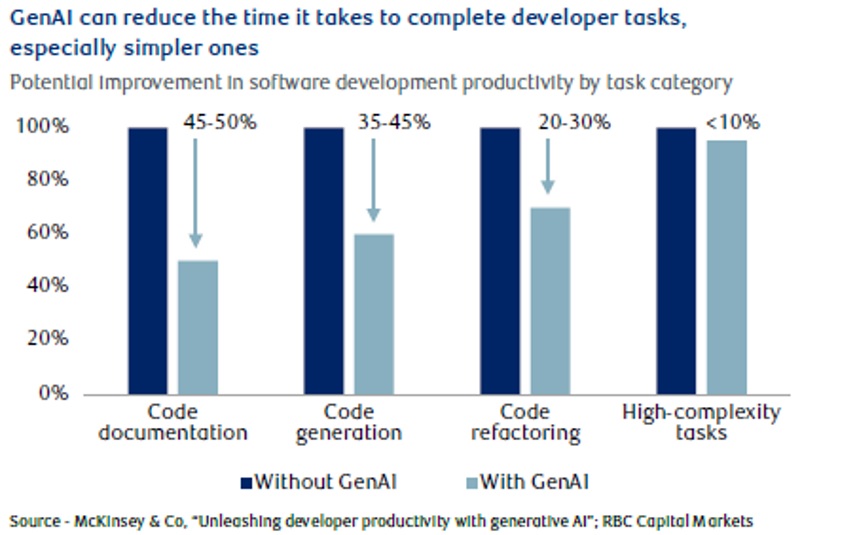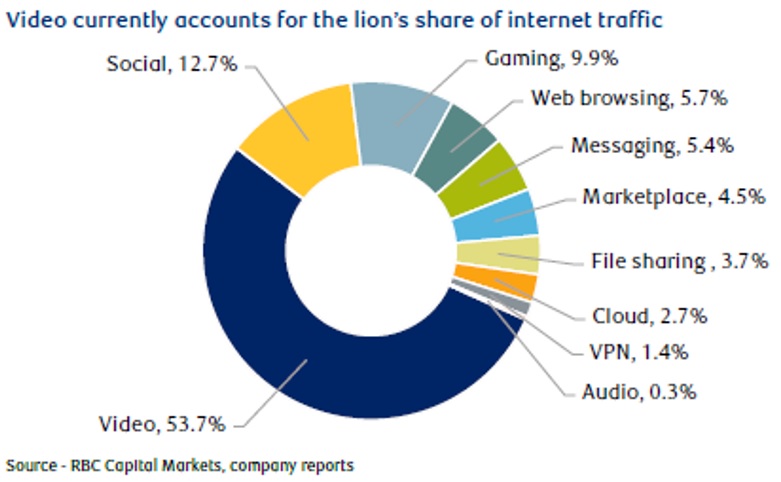Artificial intelligence (AI), particularly its newest evolution, generative AI (GenAI), is reshaping the landscape of numerous industries. With far-reaching potential to transform work, lifestyles, and interactions, GenAI is driving profound changes. The report “A cross-sector view of GenAI,” part of RBC Capital Markets' RBC Imagine global research initiative, delves into these impacts across sectors, highlighting both opportunities and risks.
Technology: Software and Cybersecurity
GenAI is reshaping software development, driving growth through improved productivity, pricing, and automation. Companies like Microsoft are incorporating GenAI-powered features, such as Copilot, into their products as premium offerings. These integrations enhance developer productivity by automating coding, accelerating software updates, and expediting product development. GenAI's capacity to automate routine customer service tasks and data collection also helps optimize costs, freeing up resources for strategic projects. However, human oversight is still crucial for ensuring the quality of automated processes.

In cybersecurity, GenAI brings both benefits and risks. The increased data volumes associated with AI elevate the risk of cyberattacks. The National Cybersecurity Center (NCC) notes that GenAI has lowered the entry barriers for novice cybercriminals, amplifying threats such as ransomware, thus requiring stronger and more innovative cybersecurity measures.
Internet Companies and Digital Marketing
GenAI is set to revolutionize digital marketing, enabling the creation of personalized content across platforms, including text and video. This personalization extends to virtual shopping experiences, where AI-powered assistants use augmented reality to show products in real time. By analyzing user behavior and preferences, AI-driven platforms can deliver tailored recommendations, increasing engagement. Innovations on the horizon include AI avatars maintaining continuity across virtual environments, AI-enhanced gaming experiences, and new personalized content creation based on user input, further leveraging data-driven insights for value creation.

Energy, Utilities, and Infrastructure
The growing adoption of GenAI significantly boosts energy demands, particularly for data centers essential to AI services. As a result, natural gas power generation becomes increasingly important. Gas power plants, due to their ability to quickly respond to supply shortages, are well-positioned to meet these rising needs. The expansion of natural gas infrastructure, such as pipelines and storage facilities, will be crucial to support data center growth, but regulatory challenges could impede new projects.
Industrials
The industrial sector, especially companies supporting AI infrastructure, stands to benefit from AI's expansion. As data centers become more densely packed with servers, traditional air cooling methods are losing viability. Liquid cooling is emerging as a more efficient and environmentally sustainable solution. The demand for electrical solutions for data solutions, such as liquid cooling, is set to grow significantly, with projections suggesting over 30% annual growth
Aerospace and Defense
In defense, AI enhances target recognition and drone operations. The U.S. Air Force is incorporating AI into autonomous systems, such as drone swarms and unmanned aircraft, to improve mission capabilities. In commercial aerospace, AI supports factory automation, predictive maintenance, and supply chain optimization, advancing industry efficiencies.
Automotive Industry
AI is poised to revolutionize the automotive industry through advanced driver-assistance systems (ADAS) and autonomous vehicles (AVs). While ADAS helps improve driving safety, AVs are expected to gain traction in commercial trucking by 2025–2026, optimizing routes, managing obstacles, and improving passenger interactions through voice recognition technology.
Financial Sector
GenAI is transforming financial services, particularly wealth management, where it helps advisors boost productivity, streamline documentation, and enhance client communication. AI also plays a critical role in algorithmic trading, fraud detection, and operational efficiency improvements.
Healthcare
In healthcare, AI offers numerous applications, including self-triage, streamlining patient intake, and analyzing medical images for faster, more accurate diagnoses. AI also facilitates patient monitoring for chronic conditions, medication reminders, and surgical data consolidation, enhancing patient care and outcomes.
Consumer Products
GenAI supports the consumer products industry by personalizing products and optimizing supply chains. For instance, L’Oréal’s Beauty Genius app provides tailored product recommendations, while Procter & Gamble uses AI to synchronize supply chains, significantly reducing costs in transportation and logistics.
Challenges and Future Considerations
Despite its promise, GenAI adoption faces challenges, including response accuracy, data privacy, and cost concerns. High implementation costs may limit its ability to replace human labor in some areas. While the long-term potential is significant, realizing the full impact of GenAI will take time. Investors and businesses must stay attuned to evolving trends as the technology advances, presenting both opportunities and risks for the future landscape.
